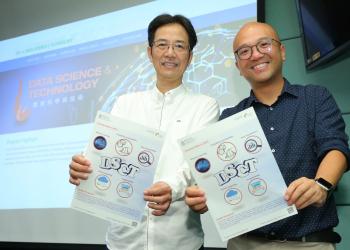News & Stories
2024
News
HKUST Commended for Research Excellence with Launch of Three JC STEM Labs
HKUST President Prof. Nancy IP (sixth right), Head of Charities (Positive Ageing and Elderly Care) of The Hong Kong Jockey Club Mr. Bryan WONG (fifth left), HKUST Provost Prof. GUO Yike (fourth left), and other senior management of HKUST inaugurate the three JC STEM Labs with three HKUST Global STEM Professors, namely Prof. ZHOU Xiaofang, Prof. XIE Ting and Prof.
2021

News
Prof. Pascale Fung: Woman Engineer Defies All Odds
Known for her outstanding achievements in artificial intelligence, Professor Pascale FUNG’s contributions go beyond her research breakthroughs and the building of intelligent systems. Having been teaching at HKUST for 24 years, Prof. Fung is also a female role model. This article is an exchange of views between a female engineering student and an AI expert about their upbringing as well as female perspective in engineering and life pursuit.
As an engineering undergraduate myself, I was lucky enough to speak to Prof. Fung, which I never had a chance before. I was a little nervous while waiting for her for the interview. But when Prof. Fung walked into the room, I was amazed by her strong sense of enthusiasm and more importantly, confidence. I instantly knew that I was going to learn so much from her.
2019

News
Go with the Flow to Fix Health Woes
Prof. Jin Qi, Assistant Professor, Department of Industrial Engineering & Decision Analytics
Freshly announced in the budget three weeks ago, a new HK$10 billion stabilization fund has been earmarked to soothe Hong Kong’s manpower-starved public medical sector.
While we welcome the initiative, we can’t help but wonder – if public hospitals are currently short-staffed and new blood requires training time – how we can cope with swamped outpatient clinics during future peak flu seasons?
Media reports last month indicated that every public ward exceeded capacity, with some patients queuing for over eight hours to see a doctor.
The inpatient bed occupancy rates of every hospital, aside from North Lantau and Tin Shui Wai hospitals, exceeded 100 percent almost on a daily basis.
Scarce resources require carefully planned policies to ensure optimal bed allocation and quality services.
2018

News
HKUST Launches HK’s First Tech-Based Degree Program in Data Science and Technology
The School of Science (SSCI) and the School of Engineering (SENG) at The Hong Kong University of Science and Technology (HKUST) jointly launched a new degree program in Data Science and Technology (DSCT) amid a pressing demand for data scientists in a world of data explosion. As the first tech-based data science program in Hong Kong for undergraduate students, DSCT seeks to nurture interdisciplinary and pragmatic talents who could address the needs of the society with data analytic and technical approaches.At present, data science programs for undergraduate students tend to focus more on the business dimension - such as how to derive business and management strategies from a pool of data, and less on data engineering skills including coding, machine learning and statistic theories.










